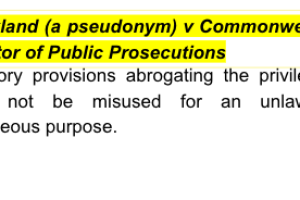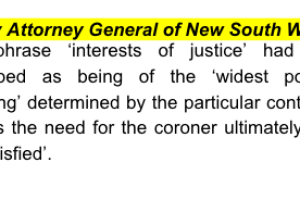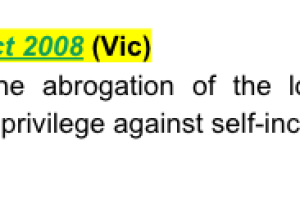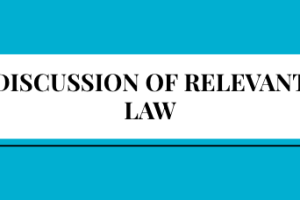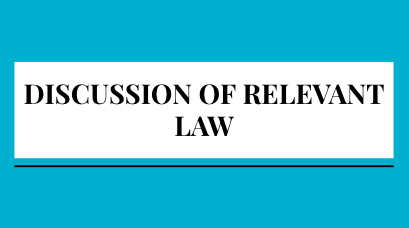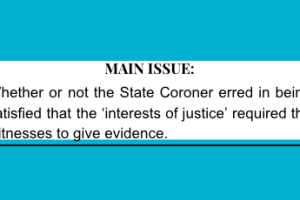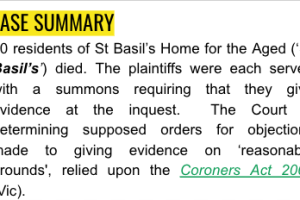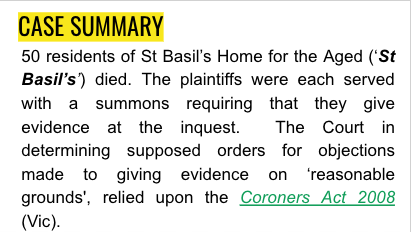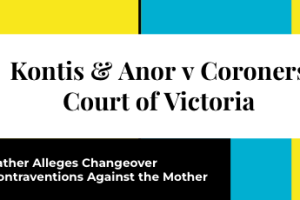Facility Objects to Giving of Evidence for Death of Residents

Kontis & Anor v Coroners Court of Victoria [2022] VSC 422 (1 August 2022)

50 residents of St Basil’s Home for the Aged (‘St Basil’s’) died. The plaintiffs were each served with a summons requiring that they give evidence at the inquest. The Court in determining supposed orders for objections made to give evidence on ‘reasonable grounds', relied upon the Coroners Act 2008 (Vic).

Facts:
In July and August 2020, 50 residents of St Basil’s Home for the Aged (‘St Basil’s’) died. Forty-five of those deaths occurred as a consequence of COVID-19. The plaintiffs were, respectively (a) the Chairman of the Board; and (b) the Facility Manager and Director of Nursing. On 12 August 2020, the State Coroner issued notices to the plaintiffs under s 42 of Coroners Act 2008 (Vic) (‘the Act’) requiring that each prepare a statement. They each declined.
On 21 October 2020, WorkSafe Victoria (‘WorkSafe’) issued a notice to St Basil’s under s 9 of the Occupational Health and Safety Act 2004 (Vic) (‘OHS Act’). Among other things, St Basil’s produced documents in answer to the notice.The plaintiffs, however, claimed a right to silence.The plaintiffs have claimed a right to silence in respect of every approach made with a view to obtaining their account of relevant events.
The State Coroner held directions hearing in the coronial inquest on 18 August 2021. By that time, various persons had sought and been granted leave to appear as an ‘interested party’, including (a) St Basil’s; (b) the Department of Health, Victoria; (c) the Commonwealth Department of Health; (d) WorkSafe; and (e) certain family members of the deceased. His Honour noted that the families were ‘looking for an explanation and an understanding of what happened and why and that he was ‘focused on that prevention opportunity that may exist.
Senior counsel recommended that the plaintiffs be summoned to give evidence at the hearing of the inquest. Senior counsel assisting emphasised that ‘the circumstances of the 50 deaths must be investigated and explained the time periods under investigation; in the course of which reference was made to various events, including notes taken at different times by the second plaintiff, communication from St Basil’s to the families by email and a discussion between the second plaintiff and a nurse.
On 27 August 2021, the plaintiffs applied for leave to appear as interested parties. A revised scope of inquiry for the inquest was settled on 8 October 2021.The plaintiffs were each served with a summons requiring that they give evidence at the inquest.The hearing of the inquest commenced on 15 November 2021.
By 15 December 2021, the position was that the plaintiffs were the only summoned witnesses remaining to be called and that day were essentially set aside in order that the ‘application’ may be heard. The plaintiffs were each called briefly; in the course of which, among other things, they objected to give evidence on the ground that it may tend to incriminate them and also objected to give evidence willingly with the protection of a certificate given under s 57(3) of the Act. His Honour reserved his decision, indicating that he would ‘endeavor to have a ruling before Christmas.
On 23 December 2021, his Honour determined that he is satisfied that it is in the interests of justice for both Ms. Kos and Mr. Kontis to be required to give evidence in this Inquest. The plaintiffs seek judicial review; which, in broad terms, depends upon demonstrating that his Honour made a material legal error in the course of determining the question that arose.

Issue:
Whether or not the State Coroner erred in being satisfied that the ‘interests of justice’ required the witnesses to give evidence.

Applicable law:
Coroners Act 2008 (Vic), Part 5, Division 2, especially s 57(4) - authorises the abrogation of the long-standing common law privilege against self-incrimination.

Rich v Attorney General of New South Wales [2013] NSWCA 419 - where the phrase ‘interests of justice’ had been described as being of the ‘widest possible meaning’ determined by the particular context as well as the need for the coroner ultimately to be so ‘satisfied’. 
R v Independent Broad-based Anti-corruption Commissioner [2016] HCA 8; (2016) 256 CLR 459 - observed that the ‘companion principle’ – that an accused person cannot be required to testify to the commission of the offence charged – had not been engaged because the appellants had not been charged.
Strickland (a pseudonym) v Commonwealth Director of Public Prosecutions (2018) 266 CLR 325 - provides that statutory provisions abrogating the privilege must not be misused for an unlawful extraneous purpose.

Lucciano v R [2021] VSCA 12 - where the issue was prejudice arising from an earlier civil proceeding in which the subject matter was historical sexual offending.
Villan v State of Victoria [2021] VSC 354 and State of Victoria v Villan [2022] VSCA 106 - Keogh J observed that it may still be in the ‘interests of justice’ to require that a witness give evidence even if the possibility of prejudice were established.
Ebner v Official Trustee in Bankruptcy [2000] HCA 63; (2000) 205 CLR 337 - provides that in the absence of any suggestion of actual bias, a question arises as to the independence or impartiality of a judge ... the governing principle is that, subject to qualifications relating to waiver ... a judge is disqualified if a fair-minded lay observer might reasonably apprehend that the judge might not bring an impartial mind to the resolution of the question the judge is required to decide.
Vakauta v Kelly [1989] HCA 44; (1989) 167 CLR 568 - provides that a party who has legal representation is not entitled to stand by until the contents of the final judgment are known and then, if those contents prove unpalatable, attack the judgment on the ground that ... there has been a failure to observe the requirement of an appearance of impartial judgment.
Analysis:
When a witness faces such a risk of the later criminal process and objects to giving evidence at an inquest, counsel for the plaintiffs submitted that most conveniently: (a) the witness should simply be excused from giving evidence; or (b) the inquest should be adjourned in order to ‘allow expiration of the criminal proceedings ... which might take some time; or (c) the coroner should make interim findings, without requiring the witness to then give evidence, and then, if necessary, re-open the inquest at a later stage.
As to any circumstances in which, under s 57(4), a coroner might determine to require such a witness to give evidence ‘in the interests of justice, counsel for the plaintiffs proffered the following (a) when a witness has been charged and the charge or charges have already been determined; and (b) when a witness has already been interviewed or ‘made numerous statements to authorities’ – which circumstances were said then to be ‘less prejudicial’. In the first scenario, the witness having earlier been charged and the charges determined, the threshold for s 57 seems unlikely to be engaged. That is, in the language of s 57(2), the witness may well have no ‘reasonable grounds for the objection’.
In the second scenario, having presumably co-operated in the making of statements in other even more potentially prejudicial settings, it is not clear how commonly it could ever be that such a witness would subsequently object to giving the very evidence that they had presumably earlier proffered willingly and not be satisfied with the granting of a certificate. The plaintiffs’ approach would, in practical terms, give a very limited zone of operation to s 57(4) in circumstances where, as counsel acknowledged, it is ‘not uncommon for the prospect of criminal charges to flow from a coronial inquest.
Such an approach cannot be reconciled with the wide statutory words in s 57(4). It may be accepted that that such a provision should be interpreted strictly, however that approach cannot avoid the words actually used or involve some form of substitution for those words.
Conclusion:
The Court cannot accept that his Honour erred by failing to take into account ‘the alteration to the system of justice effected by requiring the plaintiffs to give evidence. His Honour’s evaluation of the weight of that consideration in the whole of the circumstances does not give rise to any judicially reviewable error.
#Criminal Law

